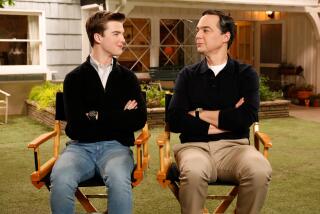Generations Have Met Holden Caulfield, but How Many Really Understand Him?
- Share via
Holden Caulfield is exactly one year older than I am. He entered my life when I was 15 and brilliantly unself-aware in the hyper self-awareness of the late ‘60s. It never occurred to me, a public-school good-girl A student, that I was a thing like him. His messy world terrified and thrilled me. He was a boy I would have hung out with--a best-friend sort of a boy. And I may even have fallen in love with him. But the lonely world he inhabited seemed to have little to do with mine.
I’d been successful at keeping sadness and confusion pretty well hidden under busy-ness. If Holden had insisted on staying innocent, I’d have insisted on staying naive. It wasn’t until I was a college sophomore, when I hit my own psychological wall, that he made personal sense to me.
For protection, I approached “Catcher” and the rest of Salinger’s fiction from a strictly academic perspective. A thoughtful student could fill blue books with analyses of the recurrent themes and symbols threading through that work. I was that student.
It was the safest way, during an unsafe time, to navigate through a chaos that had become all too familiar to me.
In the last 20 years, I’ve probably taught “Catcher in the Rye” 30 times. Most of that teaching took place in a small private school in Connecticut, a school of mostly privileged kids, a school similar in many ways to the kind of schools Holden couldn’t survive. Except that it’s a coed day school--an important difference, perhaps. I remember the fun of introducing Holden, back in the mid-’80s, to 10th-grade students whomweren’t especially interested in reading. Finally I’d given them a book they didn’t want to put down. They loved that he swore, that he was irreverent, that he was disgusted by things they wanted to be disgusted by even if, in reality, they weren’t.
But I don’t remember them talking much about Holden’s agony. Instead, many of them saw in him qualities that they admired and, in an ideal world, would have wanted. These were generally good kids who had more money than they could cope with. Though they were no more in love with the adults in their lives than I was at their age--than any adolescent is--they were trapped by the material wealth those adults represented and promised. Loving Holden, therefore, was tricky business, because it meant hating something about themselves. The only way to manage liking the book, which, by and large, they did, was to neglect to look deeply at Holden’s profound pain. Like me at their age, they could sympathize with him, but they couldn’t afford to know more.
Ten years later, in the same school, I taught the book to a group of students who, collectively, were as much like Holden as real kids could be. They were very bright, very troubled, very sensitive, and very unwilling to enter the world the adults in their lives had created for them. They engaged in smart, funny discourse and regularly failed courses because they wouldn’t do work they weren’t interested in. Depression landed a few of them in mental hospitals. They talked about suicide and they talked about pain. And most of them didn’t like “Catcher in the Rye.” At all.
This surprised me. I thought Holden was a character who could speak to them more profoundly than the sci-fi superheroes they tended to read about. I remember several of the boys in one class deriding Holden as a self-involved fake and a gimmick Salinger had created to manipulate his readers. They were a lot smarter--or at least a lot less naive--than I had been at their age. And they knew firsthand about the pain that Salinger had crafted into an amusing, if troubling, piece of literature.
*
I live in New York City now, Holden’s hometown, the place where he lost himself in dangerous anonymity. Here, private school students are still given “Catcher” to read, but usually in seventh, rather than 10th, grade. Last year I was tutoring a 13-year-old boy who struggles with psychological angst. He’s a bright kid who likes the concrete world of math, who likes stories but not symbols, who wants to do well but not at the expense of having to work hard. In many ways he’s not like Holden. He isn’t as bothered by the phoniness of the world. He doesn’t much think about meaning. But he does feel alienated. And he loved the book. Especially, he loved the freedom with which Holden swore and moved about and decided his own fate--qualities he finds missing in his own life. Did he understand Holden? Not really. He wasn’t old enough at 13. But he was isolated and angry enough to identify with him.
And so “Catcher in the Rye” has been a kind of rite of passage for a long time. I’m worried that, ironically, we may be losing that rite to the earlier and earlier loss of innocence of our children. If he were among us today, Holden would be frantic. I think his job would be bigger and more important than even he could have imagined.






